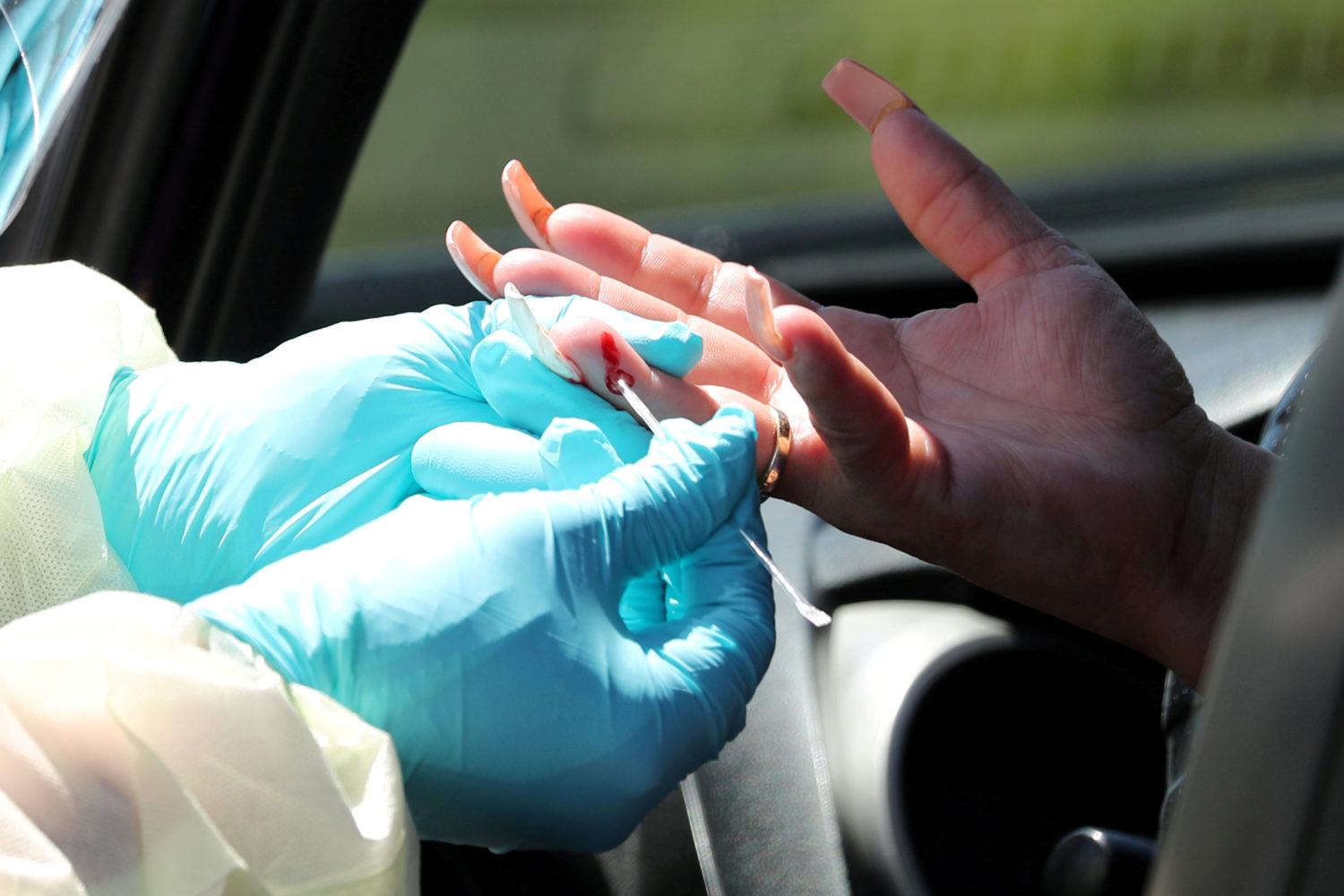
By Caroline Humer and Timothy Aeppel
NEW YORK (Reuters) – U.S. employers have cooled to the idea of testing workers for possible immunity to the coronavirus as they prepare to reopen factories and other workplaces.
Blood tests that check for antibodies to the new coronavirus have been touted by governments and some disease experts as a way to identify people who are less likely to fall ill or infect others. Italian automaker Ferrari NV has made antibody testing central to its “Back on Track” project to restarting factories.
But many U.S. companies are not planning to use them, relying on face masks, temperature checks, social distancing, and diagnostic tests for those with symptoms, employers and healthcare experts told Reuters.
Mercer, which advises companies on healthcare benefits, has surveyed more than 700 U.S. employers in industries from high tech to retail to energy, and found 8% of companies said they would include antibody tests in plans to screen employees.
Interest in antibody tests from employers has fallen in recent weeks as reports have suggested that it is too early to conclude that antibodies to the new coronavirus translate into immunity. The American Medical Association cautioned on Thursday that these tests do not determine an individual’s immunity.
“Many employers … are realizing that antibody testing isn’t going to be a silver bullet and really isn’t going to bring them any value,” said David Zieg, a lead consultant on clinical services at Mercer.
Other employers worry about their liability if they administer and interpret such tests, or are concerned about test costs and availability. Some were spooked by a flood of tests that hit the market before being reviewed by regulators for accuracy, which has contributed to confusion over results.
A new antibody test from Roche Holding AG that has shown itself to be highly accurate could potentially help answer questions about antibodies and immunity and change corporate demand, but it has not done so yet, consultants and companies said.
Governments, however, are interested in antibody tests, particularly if they are accurate. Britain on Thursday said it is in talks with Roche over buying tests that it could use to create a certificate of immunity once there is a better understanding of the science.
Collective Health, a healthcare technology company that has built back-to-work strategies for large companies, is advising employers to use diagnostic tests, not antibody tests.
“There has been a proliferation of low-quality antibody tests and the antibody tests themselves don’t necessarily answer any questions about immunity,” said Rajaie Batniji, Collective Health’s chief health officer.
GETTING BACK TO WORK
When General Motors Co, Ford Motor Co and Fiat Chrysler Automobiles NV reopen production next week, they intend to offer diagnostic tests to workers, not antibody tests. Officials at the Detroit carmakers said it was because it was not clear what the antibody tests show.
Amazon.com Inc’s on-site testing plan, now in development, does not include antibody testing. Those views were echoed in interviews with a handful of smaller U.S. manufacturers.
Shawn Kitchell, chief executive of Florida-based plastics manufacturer Madico Inc, is not planning to use antibody tests for his 250 employees. He questions their costs, accuracy, and the fact that the timing of tests can lead to different results, requiring multiple tries.
“How frequently would we need to test to make it safer for our co-workers?” Kitchell said.
Employers are also wary of an unregulated U.S. market for antibody tests. Since March, the U.S. Food and Drug Administration (FDA) has allowed more than 200 tests into the market without regulatory review to make them available quickly, opening the door to questionable vendors and inaccurate tests, Reuters found.
Last week, the agency set a deadline for all vendors to prove to the FDA that their tests work or remove them from the market. It has also authorized two highly-accurate tests from Roche and Abbott Laboratories, which are able to supply millions of tests per week.
One of the biggest U.S. testing providers, LabCorp, on Thursday said it was rolling out a program to make diagnostic tests and antibody tests available at workplaces.
LabCorp’s chief medical officer, Brian Caveney, said interest in antibody testing is coming from companies in coronavirus hotspots, such as New York, while other areas with fewer COVID-19 cases see diagnostic testing as more important.
As the new FDA process shows which tests work and which don’t, that will help advance research on how many people recovering from COVID-19 develop antibodies and at what level, and show if they are truly immune to infection, said Howard Koh, a professor at the Harvard T.H. Chan School of Public Health.
“Until we go through those steps, I don’t see how we can translate this for the typical person who wants to go back to work,” Koh said.
(This story has been refiled to change spelling to Zieg from Zeig in paragraph six)
(Reporting by Caroline Humer, Timothy Aeppel and Krystal Hu in New York and Ben Klayman in Detroit; editing by Michele Gershberg and Nick Zieminski)











